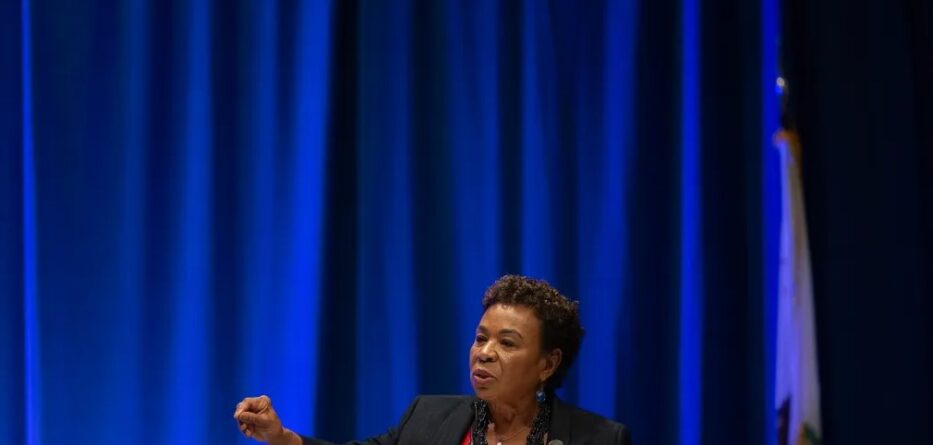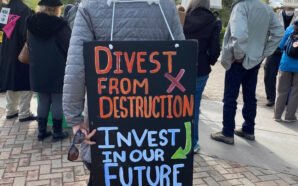Yue Stella Yu
CalMatters
In the fiercely competitive race to become California’s next U.S. senator, Barbara Lee has hardly been the candidate of the hour.
Lagging in polls, Lee was largely ignored by the other contenders during three televised debates. Her campaign — struggling to fundraise — does not have enough cash to promote her message on TV, while others have dominated the airwaves statewide.
It’s an uphill battle for Lee ahead of the March 5 primary, as she trails two fellow Democratic members of Congress — Adam Schiff and Katie Porter — as well as former baseball star Steve Garvey, a Republican. Only the top two will advance to the general election in November.
But Lee — an Oakland progressive who’s been in Congress since 1998 — believes she should not be counted out.
“I’m doing my campaign people to people, voter to voter,” she told CalMatters in an hour-long interview Thursday. She has five get-out-the-vote rallies scheduled this week, starting this evening in Oakland.
Despite largely similar voting records, Lee has diverged from Schiff and Porter on several issues, especially foreign policy. She was the first to call for a permanent ceasefire in Gaza, catching fire among a plurality of California Democratic Party delegates at their November convention.
She is the only candidate in this race to have experienced homelessness and an abortion when it was still illegal nationwide. Her past, she said, helps her connect with voters. “My background resonates with a heck of a lot of people in California,” she said.
Standing out
Being the only person of color among the top contenders, Lee said she understands first-hand the impact of racial injustice.
Case in point: A smelter that emitted chemicals in Black and brown neighborhoods in her hometown of El Paso, Texas, where her mother developed chronic obstructive pulmonary disease, Lee said.
That’s why there needs to be more Black representation in the Senate, Lee said, noting only three Black women have served in the Senate for a total 10 years since 1789. That includes Laphonza Butler, appointed by Gov. Gavin Newsom last October after the death of Sen. Dianne Feinstein.
“My perspective, which none of the other candidates have … is a perspective that many Californians have in terms of justice and in terms of fighting for policies for everyone that create equity and opportunity and freedom and justice,” Lee said.
Something else that sets her apart, she said, is that “I push the envelope early on.”
Lee received death threats for casting the lone vote against the Afghanistan War following the Sept. 11, 2001, terrorist attacks. Two decades later, she has consistently championed an amendment trying to repeal the war authorization — an effort that even gained some unlikely allies in some Republicans.
She was also among the first members of Congress to co-sponsor a resolution to impeach then- President Donald Trump in 2017, and the first to introduce a bill in 2019 to decriminalize cannabis at the federal level.
“I step out there, and sooner or later, folks fall in line,” she said.
Pushing for public campaign financing
But is the lackluster fundraising a signal that her progressive policies may be out of step with California voters?
Lee does not think so.
She acknowledged that she does not have as much campaign cash as Schiff or Porter. But that’s partly because most Californians do not have the luxury to give, she said.
“I think my agenda speaks to the agenda of the majority of Californians who are not billionaires and who are just struggling to make ends meet,” she said.
Like Schiff and Porter, Lee wants to reform the nation’s campaign finance system. All three support overturning Citizens United — the landmark U.S. Supreme Court decision barring governments from regulating corporate or union political spending — and establishing a public campaign financing system. All three have rejected contributions from corporate-run political action committees this election, although only Porter’s campaign has never taken corporate PAC money.
Drawing campaign funds from a public pool would level the playing field and help curb corporate influence, Lee said.
“The way the campaign finance system is built at this point … is very discriminatory,” she said. “Many of our colleagues … if they had access to the same type of resources that others have, they would come around because they’d be freer in terms of their legislation.”
Raising the minimum wage
For months, Lee has advocated for a $50 federal minimum wage — double the hourly rate supported by Schiff and Porter. The $50 an hour is what California families realistically need to make to survive, Lee said, citing a study by the Massachusetts Institute of Technology.
But what can the Senate really pass in the near future?
Not the $50 rate, Lee acknowledged. She said the first step is to pass the Raise the Wage Act, which would increase the federal minimum wage of $7.25 per hour to $17 by 2028. And in California, she said, the starting point may be raising the state’s $16 minimum wage to $20, indexed to inflation.
But what’s to stop businesses — now having to pay more to their employees — from passing that cost onto consumers?
Lee said it would take federal investment in small businesses to offset that cost and also require big corporations to pay their “fair share” in taxes. The federal government must also aim to lower the cost of living, such as child care, housing and gas, she added.
Reducing crime and homelessness
Lee said she is leaning toward voting for Proposition 1 — Gov. Gavin Newsom’s measure to borrow $6.4 billion to build more housing and mental health treatment facilities and also to redirect some mental health funding.
But, she said, she wants to ensure the measure does not criminalize more unsheltered people in California. “Devil’s in the details,” she said.
Should cities in California have the authority to clear out encampments, even if there’s not enough shelter for each unhoused person?
Not if local governments can’t relocate them “in a coordinated fashion” and make sure “people have safe and clean places to live,” Lee replied, adding that cities should not call in the police to clear the encampments.
“Because that starts a cycle of criminalization,” Lee explained.
In addressing California’s crime rate, Lee said the federal government must first pass a nationwide assault weapon ban and prioritize police accountability.
Lee defended how Oakland — her hometown — has handled crime, even though Newsom sent 120 California Highway Patrol officers for assistance. Oakland Mayor Sheng Thao is also facing a recall attempt as opponents claim she is “dismantling” the local police department.
Lee said she does not support the recall. “Every elected official makes mistakes,” she said.
State assistance to address Oakland’s crime problem, Lee said, “is a good first step,” but it is important to also invest in community violence prevention programs, such as using former gang members or formerly incarcerated people to prevent crime.
Going alone on foreign policy
Lee’s father, a veteran, called her right after her vote against the Afghanistan war, Lee recalled.
“(He) said: ‘That was the right vote. Do not send our troops into harm’s way not knowing what you are doing,’” she said.
Lee has brought that philosophy to many more votes on foreign policy, opposing military authorizations in Iraq in 2002 and supporting U.S. troop removal from Syria in 2023.
Beyond those votes and her stance on a ceasefire in Gaza, Lee has been the most consistent among all candidates in calling for cutting the defense budget. She is also the first to champion the Audit the Pentagon Act — which would require the defense department to pass a clean audit as it has failed a budgetary audit six times in a row.






